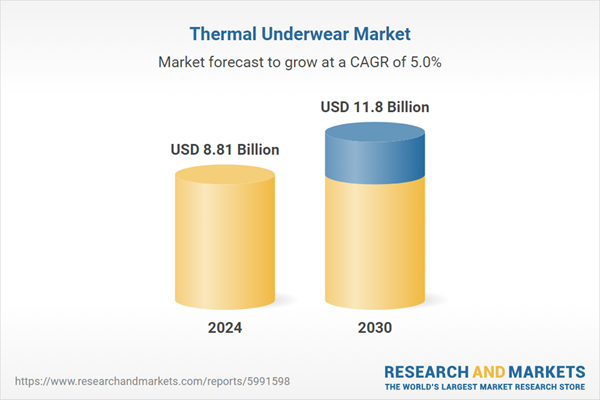Online is the fastest growing segment, Europe is the largest market globally
Speak directly to the analyst to clarify any post sales queries you may have.
10% Free customizationThis report comes with 10% free customization, enabling you to add data that meets your specific business needs.
Key Market Drivers
The increasing participation in outdoor and sports activities significantly propels the global thermal underwear market. As more consumers engage in pursuits such as skiing, snowboarding, hiking, and other cold-weather recreational activities, the demand for specialized base layers designed to provide warmth and moisture management intensifies. These garments are considered essential for comfort and performance in challenging conditions, leading to consistent product uptake. According to Snowsports Industries America, in September 2023, for the 2022-23 season, 29.9 million people participated in a winter sports activity in the U. S., reflecting a substantial rise in consumer engagement within a key segment of the outdoor market.Key Market Challenges
The global thermal underwear market is significantly hampered by its inherent dependence on seasonal demand. This seasonality creates pronounced fluctuations in sales volumes, presenting substantial challenges for manufacturers in forecasting and production planning. Periods of high demand during colder months are often followed by extended periods of reduced sales, leading to uneven revenue streams. This volatility complicates inventory management, compelling manufacturers to either hold excess stock during off-peak seasons, incurring storage costs and potential depreciation, or risk understocking during peak times, resulting in lost sales opportunities.Key Market Trends
The Global Thermal Underwear Market is significantly shaped by the integration of smart and heated apparel. This trend represents a notable advancement beyond passive insulation, encompassing garments with active heating elements, embedded sensors for biometric data collection, and connectivity features. These technological enhancements offer wearers advanced comfort and performance in demanding conditions, broadening the market appeal beyond traditional cold-weather enthusiasts. According to the Advanced Textiles Association in its "2024 State of the Textile Industry" report, smart fabrics and textiles were identified as a market area poised for growth, with 20% of surveyed industry professionals indicating its potential.Key Market Players Profiled:
- PVH Corporation
- HanesBrands Inc.
- Marks and Spencer plc
- Jockey International Inc
- Under Armour Inc.
- VF Outdoor LLC
- L.L.Bean Inc.
- Fruit of the Loom Inc.
- Miller Optik GmbH
- Thermajohn
Report Scope:
In this report, the Global Thermal Underwear Market has been segmented into the following categories:By Product Type:
- Tops
- Bottom
- Sets
By End User:
- Men
- Women
By Sales Channel:
- Supermarket/Hypermarket
- Specialty Stores
- Online
- Others
By Region:
- North America
- Europe
- Asia Pacific
- South America
- Middle East & Africa
Competitive Landscape
Company Profiles: Detailed analysis of the major companies present in the Global Thermal Underwear Market.Available Customizations:
With the given market data, the publisher offers customizations according to a company's specific needs. The following customization options are available for the report:- Detailed analysis and profiling of additional market players (up to five).
This product will be delivered within 1-3 business days.
Table of Contents
Companies Mentioned
- PVH Corporation
- HanesBrands Inc.
- Marks and Spencer plc
- Jockey International Inc
- Under Armour Inc.
- VF Outdoor LLC
- L.L.Bean Inc.
- Fruit of the Loom Inc.
- Miller Optik GmbH
- Thermajohn
Table Information
| Report Attribute | Details |
|---|---|
| No. of Pages | 182 |
| Published | November 2025 |
| Forecast Period | 2024 - 2030 |
| Estimated Market Value ( USD | $ 8.81 Billion |
| Forecasted Market Value ( USD | $ 11.8 Billion |
| Compound Annual Growth Rate | 4.9% |
| Regions Covered | Global |
| No. of Companies Mentioned | 10 |









